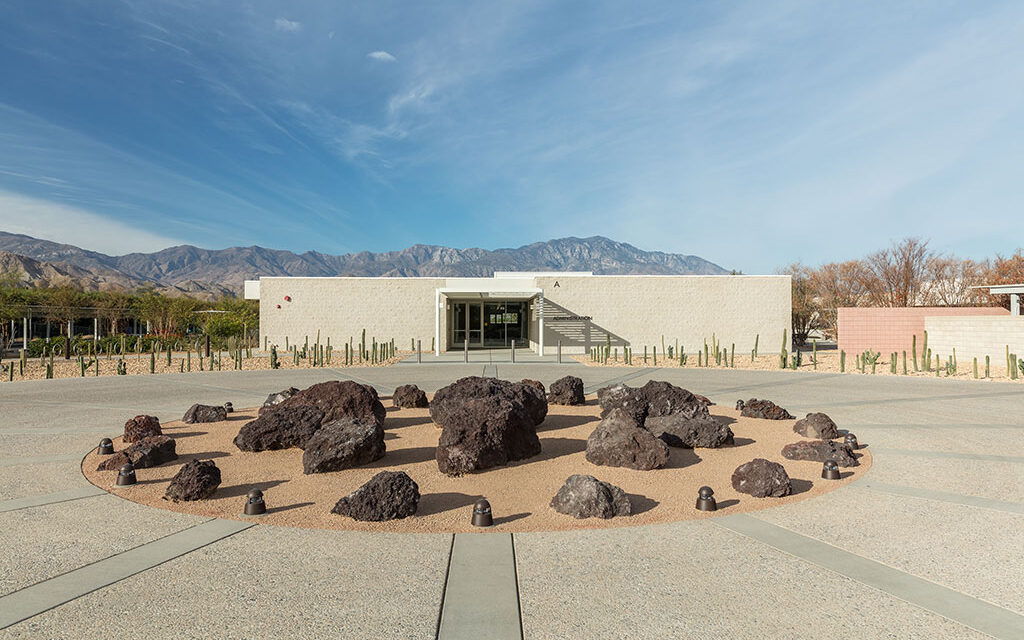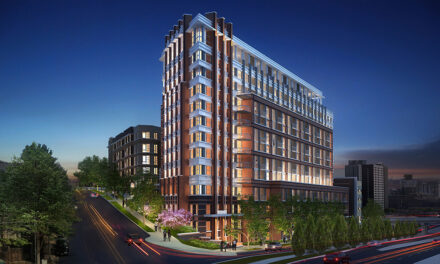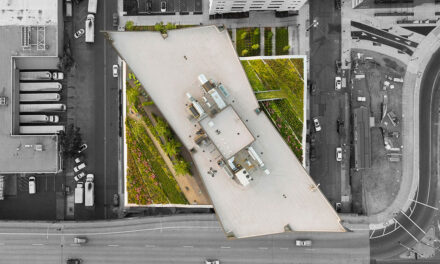The Annenberg Foundation Trust at Sunnylands is pleased to announce that its 17-acre employee campus, including administration, archives, and operations buildings, has been awarded LEED® Platinum certification, the U.S. Green Business Council’s highest rating for sustainable design.
LEED, or Leadership in Energy & Environmental Design, is a globally recognized standard of excellence in green building. LEED projects earn certification points by adhering to requirements and credits that promote healthier environments, the efficient use of electricity, and lower carbon emissions.
“LEED certification demonstrates tremendous green building leadership,” said Mahesh Ramanujam, the U.S. Green Business Council’s president and chief executive officer. “LEED was created to make the world a better place and revolutionize our buildings and communities by providing everyone with access to healthy, green, and high-performing buildings.”

A reception desk and a board room greet visitors in the Administration Building foyer. Photo credit: The Annenberg Foundation Trust at Sunnylands
The Sunnylands employee campus, completed in 2017, is the second new-construction project at the site of the former Annenberg estate in Rancho Mirage, Calif., to achieve a high standard of LEED certification. Sunnylands Center & Gardens, the 17,000-square-foot visitor center and 9-acre desert garden that serves as the public access point to the estate, earned LEED Gold certification in 2011.
“Implementing environmentally responsible practices is a core value at Sunnylands,” said David J. Lane, president of the Sunnylands trust. “It’s rewarding to see our construction efforts recognized with a LEED Platinum rating.”
Lance O’Donnell, the head of o2 Architects, the Palm Springs firm that designed the campus, said his team had its eye on a LEED Platinum rating from the start. “My team geared every aspect of design towards that goal, from building orientation, to material sourcing, to water reclamation,” he said.

Administration Building offices offer views of desert landscaping. Photo credit: The Annenberg Foundation Trust at Sunnylands
Noting Sunnylands’ location in the Colorado Desert, Lauren Hackney, senior associate at CMG Landscape Architecture, the project’s landscape design firm, said the campus “supports Sunnylands’ commitment to embodying the best practices for conservation of cultural, historic, and ecological resources in the most challenging of environments.”
Highlights of the Sunnylands campus include:
- An engineered wetland: This facility, when fully operational, will use a plant-filtration system to treat wastewater from campus buildings and the Center. The water will be recirculated to flush toilets and irrigate plants at Sunnylands.
- Water conservation: The landscape design calls for using no more water for irrigation than the amount of rain that falls on the campus’s 17 acres in a year.
- Planting strategy: To achieve its water-conservation goals, the site uses a multidimensional planting and irrigation strategy. For example, a varied rock palette is used to add color, texture, and shape to outdoor seating areas. In other locations, desert-adapted and native trees and shrubs provide additional habitat for birds, bats, and butterflies.
- Roof ventilators: Automated, large-fan ventilators and accompanying louvers in the 14,700-square-foot Administration Building open to the night sky when temperatures drop below 75 degrees. This low-energy process draws cool air into the building at night, reducing the need for additional cooling during work hours in hotter months.
- Solar orientation: Buildings on the site were designed to minimize window exposure to the east and west to curtail heat gain within the structures. Instead, windows on the north and south side of the Administration Building provide employees with sweeping views of desert landscaping.

When nighttime temperatures dip below 75 degrees, large fans draw in air to help keep the Administration Building cool during working hours in hotter months. Photo credit: The Annenberg Foundation Trust at Sunnylands
The Sunnylands campus is the central worksite for approximately 100 people employed by the trust that is responsible for preserving the historic, 200-acre estate that diplomats and philanthropists Walter and Leonore Annenberg established in 1966.
Throughout the second half of the 20th century, the couple famously hosted U.S. presidents, British royalty, and other world figures at what was then their winter home in the Southern California desert. Today, in accordance with the Annenbergs’ wishes, the trust uses the estate as a venue for diplomatic meetings and high-level retreats focused on issues of global concern.




